Related Research Articles

Ham, a chimpanzee also known as Ham the Chimp and Ham the Astrochimp, was the first great ape launched into space. On January 31, 1961, Ham flew a suborbital flight on the Mercury-Redstone 2 mission, part of the U.S. space program's Project Mercury.

Bertrand Russell Berns, also known as Bert Russell and (occasionally) Russell Byrd, was an American songwriter and record producer of the 1960s. His songwriting credits include "Twist and Shout", "Piece of My Heart", "Here Comes the Night", "Hang on Sloopy", "Cry to Me" and "Everybody Needs Somebody to Love", and his productions include "Baby, Please Don't Go", "Brown Eyed Girl" and "Under the Boardwalk".
Cinéma vérité is a style of documentary filmmaking developed by Edgar Morin and Jean Rouch, inspired by Dziga Vertov's theory about Kino-Pravda. It combines improvisation with use of the camera to unveil truth or highlight subjects hidden behind reality. It is sometimes called observational cinema, if understood as pure direct cinema: mainly without a narrator's voice-over. There are subtle, yet important, differences between terms expressing similar concepts. Direct cinema is largely concerned with the recording of events in which the subject and audience become unaware of the camera's presence: operating within what Bill Nichols, an American historian and theoretician of documentary film, calls the "observational mode", a fly on the wall. Many therefore see a paradox in drawing attention away from the presence of the camera and simultaneously interfering in the reality it registers when attempting to discover a cinematic truth.

The Burke and Wills expedition was organised by the Royal Society of Victoria (RSV) in Australia in 1860–61. It initially consisted of nineteen men led by Robert O'Hara Burke, with William John Wills being a deputy commander. Its objective was the crossing of Australia from Melbourne in the south to the Gulf of Carpentaria in the north, a distance of around 3,250 kilometres. At that time most of the inland of Australia had not been explored by non-Indigenous people and was largely unknown to European settlers.

Mary William Ethelbert Appleton Burke, better known as Billie Burke, was an American actress who was famous on Broadway and radio, and in silent and sound films. She is best known to modern audiences as Glinda the Good Witch of the North in the MGM film musical The Wizard of Oz (1939)

Henry William Thompson was an American country music singer-songwriter and musician whose career spanned seven decades.

Richard Leacock was a British-born documentary film director and one of the pioneers of direct cinema and cinéma vérité.

Burke & Wills is a 1985 Australian adventure film directed by Graeme Clifford, starring Jack Thompson and Nigel Havers. The film is based on the ill-fated Burke and Wills expedition across Australia.

Nora Noel Jill Bennett was a British actress.

William John Wills was a British surveyor who also trained as a surgeon. He was the second-in-command of the Burke and Wills expedition, which was the first expedition to cross Australia from south to north, finding a route across the continent from the settled areas of Victoria to the Gulf of Carpentaria. He and the expedition leader Robert O'Hara Burke both died of exhaustion on the expedition's return journey.
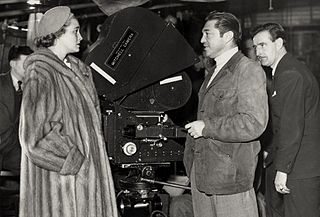
Vincent Sherman was an American director and actor who worked in Hollywood. His movies include Mr. Skeffington (1944), Nora Prentiss (1947), and The Young Philadelphians (1959).
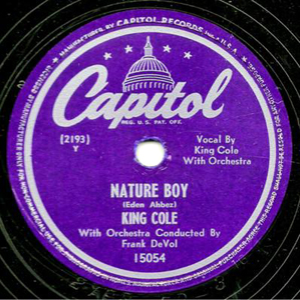
"Nature Boy" is a song first recorded by American jazz singer Nat King Cole. It was released on March 29, 1948, as a single by Capitol Records, and later appeared on the album The Nat King Cole Story. It was written by eden ahbez as a tribute to Bill Pester, who practiced the Naturmensch and Lebensreform philosophies adopted by Ahbez. The lyrics of the song relate to a 1940s Los Angeles–based group called "Nature Boys", a subculture of proto-hippies of which Ahbez was a member.

Alfred Burke was an English actor, perhaps best known for his portrayal of Frank Marker in the long running drama series Public Eye, which ran on television for ten years.
Paul Horn was an American flautist, saxophonist, composer and producer. He became a pioneer of world and new age music with his 1969 album Inside. He received five Grammy nominations between 1965 and 1999, including three nominations in 1965.
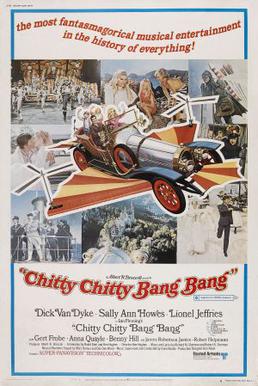
Chitty Chitty Bang Bang is a 1968 children's musical fantasy film directed by Ken Hughes and produced by Albert R. Broccoli. It stars Dick Van Dyke, Sally Ann Howes, Lionel Jeffries, Gert Fröbe, Anna Quayle, Benny Hill, James Robertson Justice, Robert Helpmann, Heather Ripley and Adrian Hall. The film is based on the 1964 children's novel Chitty-Chitty-Bang-Bang: The Magical Car by Ian Fleming, with a screenplay co-written by Hughes and Roald Dahl.

The Lost World is a 1960 American fantasy adventure film directed by Irwin Allen, loosely based on the 1912 novel of the same name by Arthur Conan Doyle. Shot in De Luxe Color and CinemaScope, the film's plot revolves around the exploration of a plateau in Venezuela inhabited by cannibals, dinosaurs, carnivorous plants, and giant spiders. The cast includes Claude Rains, David Hedison, Fernando Lamas, Jill St. John, and Michael Rennie.
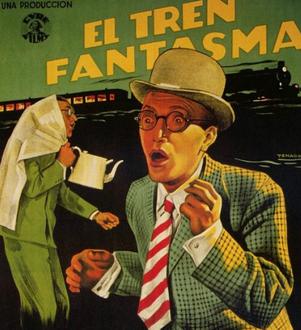
The Ghost Train is a 1941 British thriller mystery film directed by Walter Forde and starring Arthur Askey and Richard Murdoch. It is based on the 1923 play The Ghost Train by Arnold Ridley.
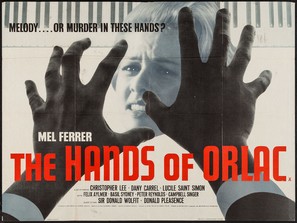
The Hands of Orlac is a 1960 horror film directed by Edmond T. Gréville, starring Mel Ferrer, Christopher Lee and Dany Carrel. It was written by Gréville, John V. Baines with additional dialogue by Donald Taylor. It was based on the novel Les Mains d'Orlac by Maurice Renard, which had previously adapted into silent film and as a Hollywood film production.
John Kemeny was a Hungarian-Canadian film producer whom the Toronto Star called "the forgotten giant of Canadian film history and...the most successful producer in Canadian history." His production credits include The Apprenticeship of Duddy Kravitz, Atlantic City, and Quest for Fire.
William Sterling was an Australian producer and director. He was born in Sydney.
References
- ↑ "Actor Away from TV Play Burke, Wills". The Age. 13 July 1961. p. 14.
- ↑ "Sterling to Direct a Film". The Age. 11 January 1961. p. 1.
- ↑ Borschmann, Gregg (15 January 1977). "Will Sterling Comes Home". The Age. p. 18.
- 1 2 Bennett, Colin (16 April 1966). "Credit Where Due". The Age. p. 23.
- ↑ "The summer visitors". The Bulletin. 6 January 1973. p. 24.
- ↑ "Teletopics". The Age. 19 September 1963. p. 10.